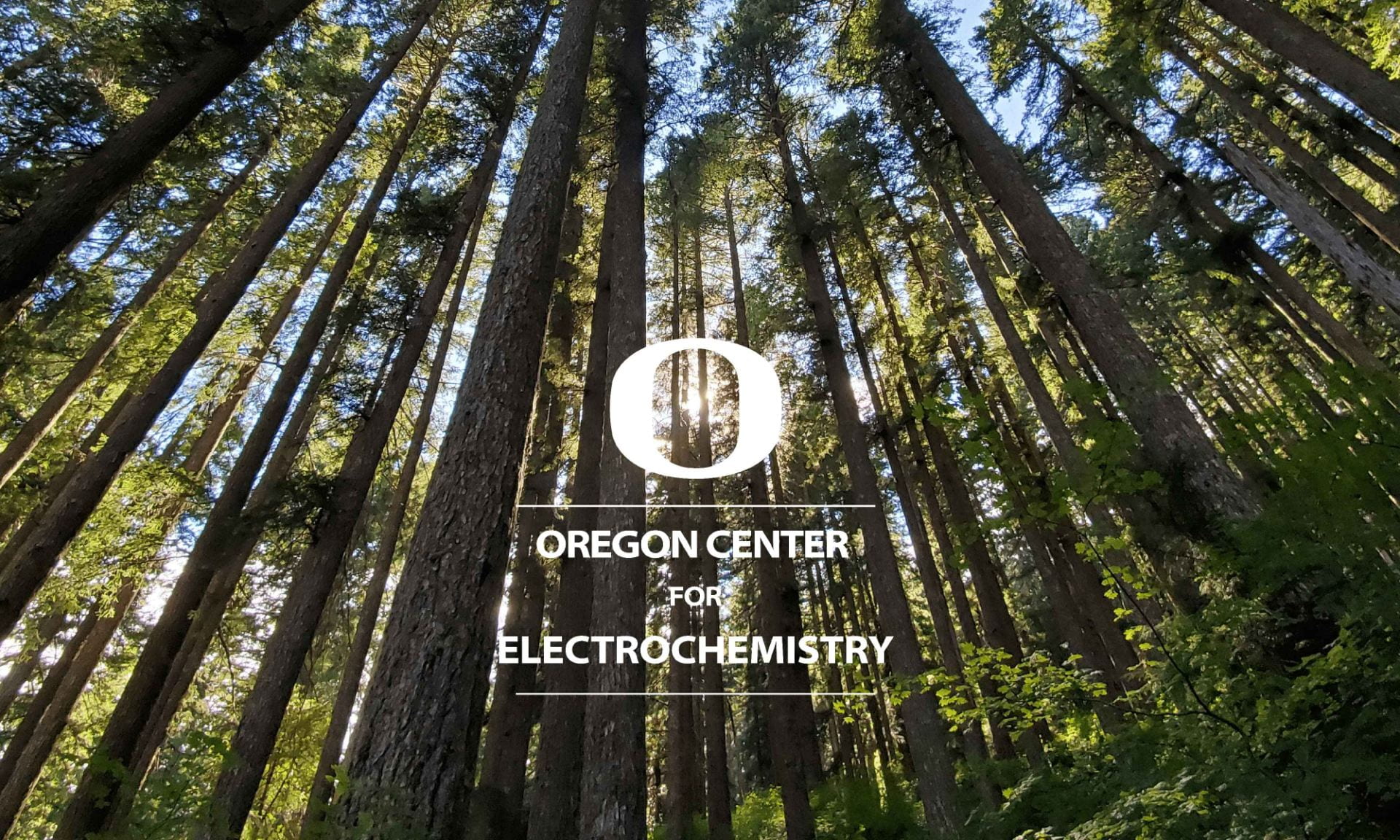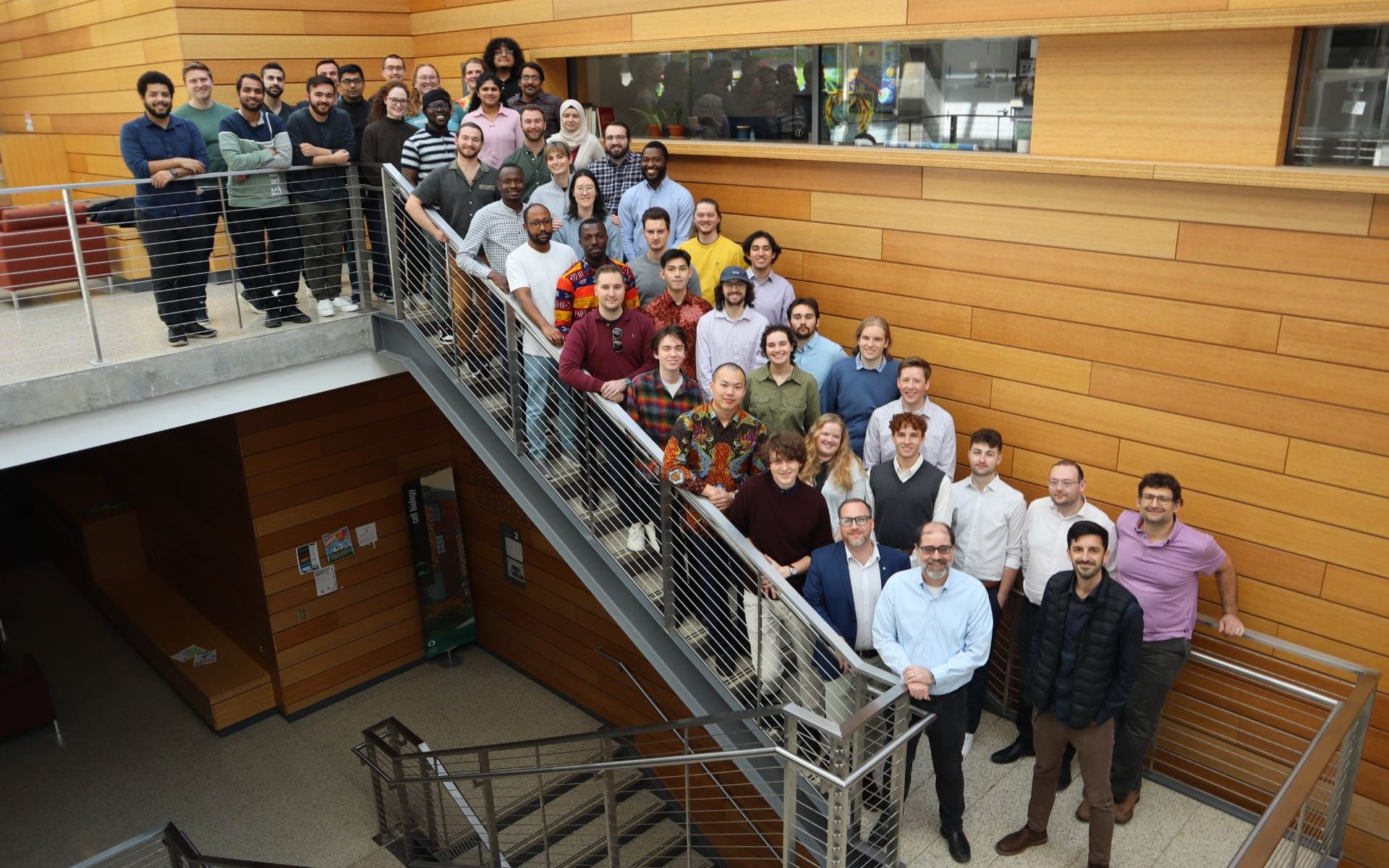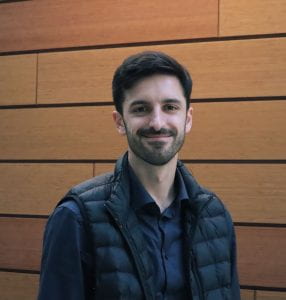University of Oregon
Prof. Paul Kempler
Biography: Kempler is an Assistant Professor of Chemistry and Biochemistry and the interim Director of the Oregon Center for Electrochemistry. At Oregon he has developed state-of-the-art electrochemical technology laboratory courses integrating experiments in analytical electrochemistry and electrochemical engineering with coding in Python. His current research efforts include studying interfacial ion-transport processes and developing electrochemical technologies to assist global efforts toward deep decarbonization. In particular, his group is interested in electrochemical methods for producing iron for emissions-free steelmaking and he has led multiple collaborative projects with industry and national laboratory partners studying low-temperature reduction of oxides to metals. Kempler has a Ph.D. in Chemical Engineering from the California Institute of Technology (2020) where he studied the optical properties and gas evolution characteristics of microstructured semiconductors used to convert sunlight and water into hydrogen. He received a UO Sustainability Award for Research and Scholarship in 2023.
web: http://kempler.uoregon.edu
email: pkempler@uoregon.edu
Prof. Fuding Lin
 Biography: Lin is an Associate Teaching Professor and the Director of the Electrochemistry Master’s Internship Program (EMIP), dedicated to helping students launch successful careers through affordable, efficient, and industry-connected graduate programs. He focuses on bridging academic research with impactful industry applications and connecting companies with competent, committed, and collaborative talent. Before joining OCE/EMIP in 2024, Dr. Lin was director of the semiconductor graduate internship program at the UO Knight Campus, where he spent 10+ years helping hundreds of students thrive as applied scientists and engineers in the industry. He strongly believes in continuous integration of industry feedback to enhance graduate curricula and foster problem-solving skills through experiential learning. Dr. Lin’s technical interests include Electrochemistry, Design of Experiment, and Semiconductor Processing. In his free time, he enjoys playing badminton and spending time with others over a good cup of coffee or tea.
Biography: Lin is an Associate Teaching Professor and the Director of the Electrochemistry Master’s Internship Program (EMIP), dedicated to helping students launch successful careers through affordable, efficient, and industry-connected graduate programs. He focuses on bridging academic research with impactful industry applications and connecting companies with competent, committed, and collaborative talent. Before joining OCE/EMIP in 2024, Dr. Lin was director of the semiconductor graduate internship program at the UO Knight Campus, where he spent 10+ years helping hundreds of students thrive as applied scientists and engineers in the industry. He strongly believes in continuous integration of industry feedback to enhance graduate curricula and foster problem-solving skills through experiential learning. Dr. Lin’s technical interests include Electrochemistry, Design of Experiment, and Semiconductor Processing. In his free time, he enjoys playing badminton and spending time with others over a good cup of coffee or tea.
email: flin@uoregon.edu
Prof. Gary S. Harlow
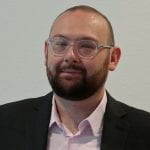
Biography: Harlow is a Research Assistant Professor and an Associate Director of the Oregon Center for Electrochemistry. His research focuses on a mixture of fundamental and applied electrochemistry with topics ranging from double layer structure to electrocatalysis and corrosion. He is an expert in synchrotron-based techniques, and particularly surface x-ray diffraction. He completed his PhD with Prof. Christopher Lucas at the University of Liverpool (UK) in 2016 in Physics. Afterwards he worked in the group of Prof. Edvin Lungren at Lund University (Sweden) as a postdoc and then as a researcher where developed his own electrochemistry course and co-supervised 3 PhD students. This was followed by a short postdoc in the group of María Escudero-Escribano at the University of Copenhagen. Prior to joining OCE he held a joint researcher position between Malmö University and the NanoMax beamline at the MAX IV synchrotron in Sweden.
web: https://harlow.uoregon.edu/
email: gharlow@uoregon.edu
Prof. Melepurath Deepa
 Biography: Deepa is a Visiting Professor for 2024-2026 and currently a Professor of Chemistry at IIT Hyderabad. During her tenure at IIT Hyderabad, she was the Head of the Department of Chemistry for four years and Dean Faculty for two years. Her present research focuses on Zn-ion and Al-based batteries, solution processed solar cells, electrochromic materials and dual-purpose devices. She has authored over 190 journal articles and has a h-index of 45. Deepa has been a recipient of the Dr. G.C. Jain Memorial Prize by Materials Research Society of India for the Best Ph.D. Thesis in Materials Science in 2006, the CSIR Young Scientist Award in 2008, the NASI – Young Scientist Platinum Jubilee Award in 2010 and the B.M. Birla Science Prize in 2013- all in Chemical Sciences as well as the Faculty Research Excellence Award from IITH in 2020.
Biography: Deepa is a Visiting Professor for 2024-2026 and currently a Professor of Chemistry at IIT Hyderabad. During her tenure at IIT Hyderabad, she was the Head of the Department of Chemistry for four years and Dean Faculty for two years. Her present research focuses on Zn-ion and Al-based batteries, solution processed solar cells, electrochromic materials and dual-purpose devices. She has authored over 190 journal articles and has a h-index of 45. Deepa has been a recipient of the Dr. G.C. Jain Memorial Prize by Materials Research Society of India for the Best Ph.D. Thesis in Materials Science in 2006, the CSIR Young Scientist Award in 2008, the NASI – Young Scientist Platinum Jubilee Award in 2010 and the B.M. Birla Science Prize in 2013- all in Chemical Sciences as well as the Faculty Research Excellence Award from IITH in 2020.
Prof. Matthias Agne
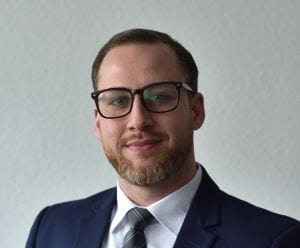
Biography: Agne is an Assistant Professor in the Department of Chemistry and Biochemistry. The Agne Lab does technology-motivated fundamental research of energy and environmental materials using a combined theoretical, computational and experimental approach. Thermodynamic principles and microscopic models are used to build an understanding of complex behavior in solids, such as thermal, electronic and ionic transport, and targeted experiments are used to test our theories. In particular, we are interested in experimentally characterizing and theoretically describing atomic vibrational dynamics in order to develop predictive models of transport phenomena in solid-state battery materials, thermoelectrics, and superconductors. We also work to identify and mitigate thermodynamic driving forces for interfacial instability in electrochemical and engineering systems.
Prof. Mark Lonergan
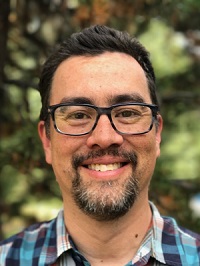 Biography: Lonergan is a Professor in the Department of Chemistry and Biochemistry and a member of the Materials Science Institute at the University of Oregon. His research blends synthesis, physical measurement, numerical simulation and rational design to better understand or discover interesting electrical and electrochemical phenomena in solid-state systems. He is particularly interested in using chemistry to control interfacial electron transfer processes, which can depend on applied bias in complex, nonlinear, and often asymmetric ways. Practical impetus for the work comes from the importance of electroactive interfaces to many devices for the useful manipulation of electrical energy including solar cells, batteries, fuel cells, and logic gates. Lonergan has won major awards from the Beckman and Dreyfus foundations.
Biography: Lonergan is a Professor in the Department of Chemistry and Biochemistry and a member of the Materials Science Institute at the University of Oregon. His research blends synthesis, physical measurement, numerical simulation and rational design to better understand or discover interesting electrical and electrochemical phenomena in solid-state systems. He is particularly interested in using chemistry to control interfacial electron transfer processes, which can depend on applied bias in complex, nonlinear, and often asymmetric ways. Practical impetus for the work comes from the importance of electroactive interfaces to many devices for the useful manipulation of electrical energy including solar cells, batteries, fuel cells, and logic gates. Lonergan has won major awards from the Beckman and Dreyfus foundations.
web: https://chemistry.uoregon.edu/profile/lonergan/
email: lonergan@uoregon.edu
Prof. Carl Brozek
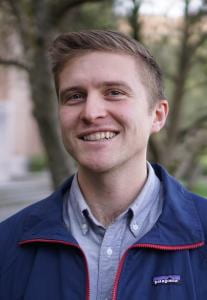
Biography: Brozek is an Assistant Professor of Chemistry and Biochemistry and a member of the Materials Science Institute at the University of Oregon. He studies redox processes of the “nanoscale gap” between small molecules and macroscopic materials. Systems existing on this size regime are widely pursued for tackling problems in energy capture and sustainable growth, and yet their intermediary behavior resists description by conventional concepts and tools. His goal is to investigate the fundamental properties of compounds that blur the distinction between molecules and materials, and leverage this insight for designing better catalysts and electronic/electrochemical devices. Brozek won the Davison Thesis Prize for his PhD work at MIT (Best Inorganic Thesis), won the ACS Division of Chemistry Young Investigator Award in 2016, and was a Washington Research Foundation Innovation Postdoctoral Fellow in Clean Energy
web: https://brozeklab.uoregon.edu/
email: cbrozek@uoregon.edu
Prof. Chris Hendon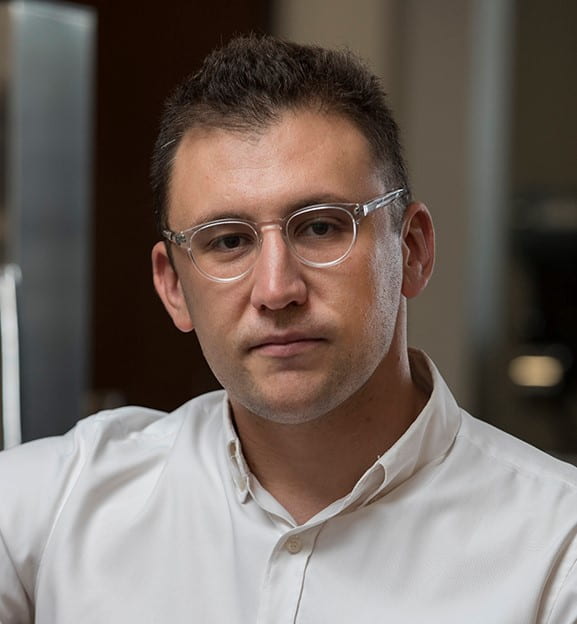
Biography: Hendon is an Associate Professor of Chemistry and Biochemistry and a member of the Materials Science Institute at the University of Oregon. He directs a research team dedicated to materials theory and high performance computing. He is a leading expert in understanding the electronic and electronic properties of porous materials using density function theory calculations. He works in the Oregon Center for Electrochemistry to understand water dissociation reactivity on metal oxide surfaces for application in electrocatalysis and bipolar membranes. Hendon completed his PhD at the University of Bath followed by postdoctoral studies at MIT. His work has been cited > 8,000 times.
web: https://pages.uoregon.edu/chendon/
email: chendon@uoregon.edu
Prof. Shannon Boettcher, Founder and Advisor
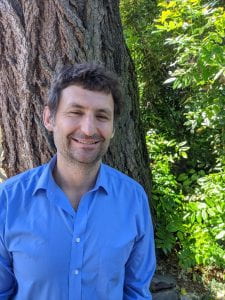 Biography: Boettcher is a Research Professor in the Materials Science Institute at the University of Oregon and a Professor in the Department of Chemical & Biomolecular Engineering at University of California Berkeley. His research is at the intersection of electrochemistry and materials science, with a focus on fundamental aspects of energy conversion and storage. He has been named a DuPont Young Professor, a Cottrell Scholar, a Sloan Fellow, and a Camille Dreyfus Teacher-Scholar. He served as a Senior Editor for ACS Energy Letters. His research has been funded by major grants from NSF (CHE, PFI, CCI, MRI), DOE (BES, ARPA-E, EERE FCTO, EERE Sunshot), and DoD ONR MURI. He has published over 120 manuscripts related to electrochemical systems, catalysis, and inorganic chemistry that have garnered over 24,000 citations and he was named a 2019, 2020 and 2021 ISI highly cited researcher (top 0.1%). He founded the Oregon Center for Electrochemistry in Fall of 2019 and was the Blavatnik National Award winner in 2023.
Biography: Boettcher is a Research Professor in the Materials Science Institute at the University of Oregon and a Professor in the Department of Chemical & Biomolecular Engineering at University of California Berkeley. His research is at the intersection of electrochemistry and materials science, with a focus on fundamental aspects of energy conversion and storage. He has been named a DuPont Young Professor, a Cottrell Scholar, a Sloan Fellow, and a Camille Dreyfus Teacher-Scholar. He served as a Senior Editor for ACS Energy Letters. His research has been funded by major grants from NSF (CHE, PFI, CCI, MRI), DOE (BES, ARPA-E, EERE FCTO, EERE Sunshot), and DoD ONR MURI. He has published over 120 manuscripts related to electrochemical systems, catalysis, and inorganic chemistry that have garnered over 24,000 citations and he was named a 2019, 2020 and 2021 ISI highly cited researcher (top 0.1%). He founded the Oregon Center for Electrochemistry in Fall of 2019 and was the Blavatnik National Award winner in 2023.
web: http://boettcher.uoregon.edu
email: swb@uoregon.edu
Oregon State University
Prof. Xiulei (David) Ji
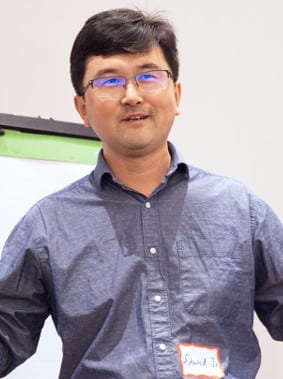 Biography: Ji is an Associate Professor of Chemistry at Oregon State University. His primary research interest is to elucidate the basic structure-property correlation for battery electrode materials for sustainable energy storage. He has published over 115 articles, in journals including Nature Materials, Nature Chemistry, Nature Energy, J. Am. Chem. Soc., and Angew. Chem. Int. Ed., with over 18,000 total citations. In 2019 he was named an ISI highly cited researcher (top 0.1 %). He received a 2016 NSF CAREER Award and a 2010 NSERC Postdoctoral Fellowship.
Biography: Ji is an Associate Professor of Chemistry at Oregon State University. His primary research interest is to elucidate the basic structure-property correlation for battery electrode materials for sustainable energy storage. He has published over 115 articles, in journals including Nature Materials, Nature Chemistry, Nature Energy, J. Am. Chem. Soc., and Angew. Chem. Int. Ed., with over 18,000 total citations. In 2019 he was named an ISI highly cited researcher (top 0.1 %). He received a 2016 NSF CAREER Award and a 2010 NSERC Postdoctoral Fellowship.
web: http://jigroup.chem.oregonstate.edu/
email: David.Ji@oregonstate.edu
Prof. Zhenxing Feng
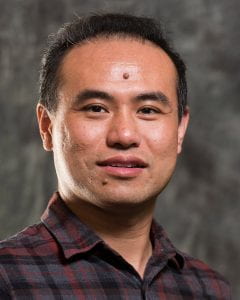
Biography: Feng is an Associate Professor of Chemical Engineering in School of Chemical, Biological, and Environmental Engineering and a jointed faculty in Materials Science Program at Oregon State University. He obtained his Ph.D. in Materials Science and Engineering of Northwestern University. Prof. Feng is interested in finding design principles of various materials for energy harvesting, conversion, and storage applications, with a particular focus on the studies of interfacial processes in electrochemical systems using in-situ X-ray scattering, spectroscopy, and imaging techniques.
web: http://research.engr.oregonstate.edu/feng/
email: zhenxing.feng@oregonstate.edu
Prof. Dipankar Koley
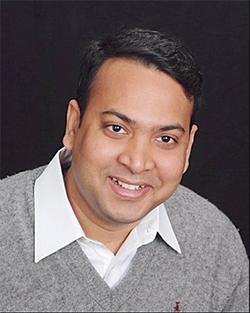
Biography: Koley is an Assistant Professor of Chemistry at Oregon State University. His team uses and develops a wide variety of electrochemical techniques to understand the complex biological systems. His research efforts lie at the intersection of electrochemistry, biology and bioengineering. For example, his team develops advanced electrochemical techniques such as scanning electrochemical microscopy (SECM) to study microbial metabolites in real-time and in three dimensions to elucidate the microbial behavior in the context of biofilm-related diseases (cystic fibrosis) and infections in/on biomedical devices (catheters, artificial heart valves etc.). His findings will ultimately inform the design of the next generation of smart biomedical devices.
web: https://www.koleylab.com/
email: dipankar.koley@oregonstate.edu
